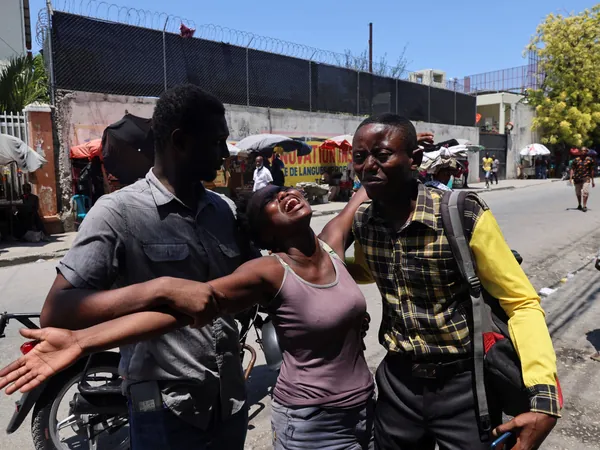
UN Reports Alarming Spike in Gang Violence in Haiti: Over 3,600 Lives Lost in 2023
2024-09-27
Overview of the Gang Violence Crisis in Haiti
In a grim revelation, the United Nations has confirmed that at least 3,661 individuals have tragically lost their lives due to escalating gang violence in Haiti during the first half of this year. This shocking statistic includes the heartbreaking loss of 100 children, illustrating the severe and widespread impact of this crisis.
Continued Violence and Human Rights Violations
The UN Office of the High Commissioner for Human Rights (OHCHR) reported on Friday that the rampant violence has continued from last year, indicating that the situation in Haiti remains critically dangerous for its citizens. UN rights chief Volker Turk stressed, 'No more lives should be lost to this senseless criminality,' highlighting the urgent need for intervention.
Root Causes of the Violence
Haiti has been grappling with the devastation caused by powerful armed groups that often enjoy connections to various political and business elites within the country. This year, the turmoil intensified dramatically at the end of February when gangs coordinated attacks on prisons and key state institutions in the capital, Port-au-Prince.
Patterns of Human Rights Violations
A report by the UN detailed 'extremely serious patterns of human rights violations and abuses,' particularly in Port-au-Prince and the Artibonite Department. Furthermore, alarming signs of increased violence in the previously less-affected southern regions point to a broadening of the conflict.
Sexual Violence as a Tool of Intimidation
Disturbingly, gangs are employing sexual violence as a method of intimidation and control, using it as a tool to instill fear within communities. The crisis is exacerbated by the rampant arms trafficking in the region, with firearms flowing primarily from the United States, as well as from neighboring Dominican Republic and Jamaica.
Call for International Intervention
In an urgent call to action, Turk urged the international community to impose a strict global arms embargo, alongside a travel ban and asset freeze measures from the UN Security Council.
Political Changes in Haiti
The surge in violence has forced significant political changes in Haiti, including the resignation of the unelected prime minister and the establishment of a transitional presidential council. Additionally, a multinational force named the Multinational Security Support Mission (MSS), led by Kenya and backed by the UN, is poised to assist the beleaguered nation.
Status of the Multinational Security Support Mission (MSS)
While over 3,100 troops from around 10 different countries have pledged support, only 430 have been deployed thus far, according to OHCHR. As the MSS's one-year mandate nears its conclusion, the UN Security Council is scheduled to vote on its renewal on September 30.
Urgent Appeals for Assistance
Haiti has urged the UN to transition this mission into a formal peacekeeping operation to secure stable funding and resources essential for significant impact. At the recent UN General Assembly in New York, Haiti’s interim prime minister, Garry Conille, made an impassioned plea for international assistance, stating, 'We are nowhere near winning this, and the simple reality is that we won’t without your help.'
Humanitarian Crisis and Appeals for Aid
The repercussions of the violence are staggering, as the number of internally displaced individuals has nearly doubled in just six months to over 700,000, while 1.6 million people are currently experiencing emergency levels of food insecurity. The need for humanitarian aid and intervention has never been more pressing, as Haiti continues to battle the devastating consequences of a crisis that shows no signs of abating.
A Call for Global Action
This escalating situation calls for immediate attention and decisive action from the global community—without which, the humanitarian catastrophe in Haiti may spiral further out of control.




 Brasil (PT)
Brasil (PT)
 Canada (EN)
Canada (EN)
 Chile (ES)
Chile (ES)
 España (ES)
España (ES)
 France (FR)
France (FR)
 Hong Kong (EN)
Hong Kong (EN)
 Italia (IT)
Italia (IT)
 日本 (JA)
日本 (JA)
 Magyarország (HU)
Magyarország (HU)
 Norge (NO)
Norge (NO)
 Polska (PL)
Polska (PL)
 Schweiz (DE)
Schweiz (DE)
 Singapore (EN)
Singapore (EN)
 Sverige (SV)
Sverige (SV)
 Suomi (FI)
Suomi (FI)
 Türkiye (TR)
Türkiye (TR)